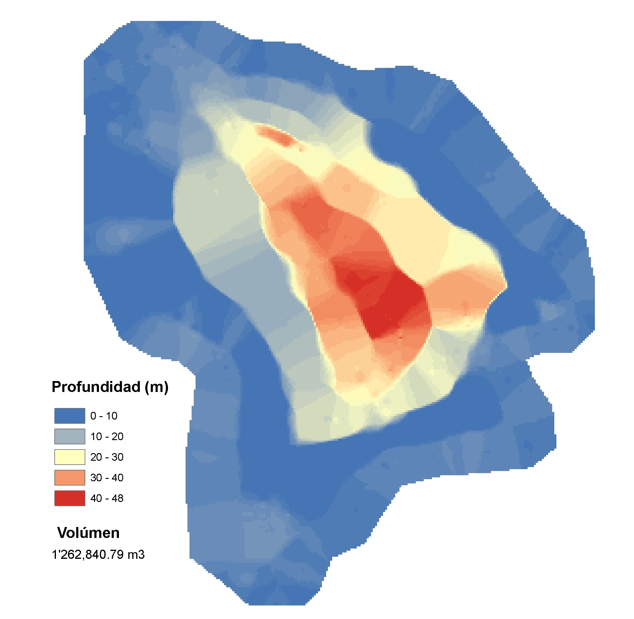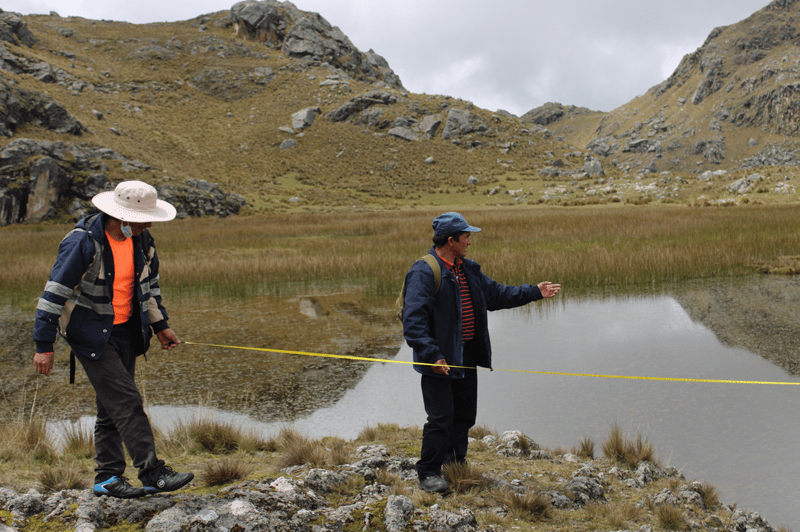The project team of the EUROCLIMA+ Agua project Water for Abancay visited the upper part of the micro-watershed of the Mariño river to measure the depth, the type of
bottom and to detect objects in the Yauriccocha lagoon.
28 March 2022. Abancay, Peru. The water supply of Abancay, a growing intermediate city in Peru, is insufficient and vulnerable to declines due to land use changes and climate change. Water monitoring is part of the actions of the Water for Abancay project and its communities by the Urban Water sector of EUROCLIMA+. Therefore, the project team visited the upper part of the micro-watershed of the Mariño river in order to measure the storage volume of the Yauriccocha lagoon, and thus, to know the highest storage peak in cubic metres during the rainy season.
To calculate this volume, an echo sounder was used, a tool that uses ultrasound emission to determine the depth, type of bottom and the detection of underwater objects.
Yauriccocha is part of a network of qochas (small dams that allow the planting of water). A wetland located to the southeast of the lagoon was also detected, which due to its vegetation allows permanent water storage and in the low water season (i.e. when the lagoon reaches its minimum flow level), it drains directly into the lagoon, thus increasing its volume. "This visit has allowed us to identify at least 48 metres of depth in the deepest part of the lagoon", said Sandro Arias, specialist consultant for the project and technician from Senamhi Peru.
This study is the first to be carried out in the entire network of lagoons located in the headwaters of the Mariño micro-basin, and it is hoped to continue with the other lagoons in the short term. Among the preliminary results, we can indicate:
- The storage volume is 1.262.841 m3
- The project contributes to ensuring the future availability, responsible and equitable use of water in Abancay and its communities. To this end, through a sustainable mechanism of investment in natural infrastructure, optimised and resilient demand, multi-stakeholder governance and generating replicable lessons learned, a series of strategies and actions are being implemented.
Water for Abancay and the Communities seeks to generate a working model that combines a water supply approach with the management of the demand of a growing city, within a framework of multi-stakeholder water governance in the basin.
The Water for Abancay and Communities project is funded by EUROCLIMA+, through AFD, with SUNASS as national leader and implemented by Helvetas Peru in partnership with the Municipal Potable Water and Sanitation Company (EMUSAP Abancay) and the NGO Centre for Studies and Social Development (CEDES Apurímac).

EUROCLIMA+ sector Water management with an urban resilience perspective
Through this sector of the EUROCLIMA+ programme implemented by the Spanish Agency for International Development Cooperation (AECID) and the French Development Agency (AFD), a total of seven projects will be implemented. For more information on each project, please visit: https://www.euroclima.org/agua
About EUROCLIMA+
EUROCLIMA+ is a programme funded by the European Union and co-financed by the German federal government through the Federal Ministry for Economic Cooperation and Development (BMZ), as well as by the governments of France and Spain through the Ministry of Foreign Affairs, European Union and Cooperation.
The Programme's mission is to reduce the impact of climate change and its effects in 18 countries in Latin America and the Caribbean, promoting mitigation, adaptation, resilience and climate investment. It is implemented according to the "Spirit of Team Europe" under the synergistic work of seven agencies: the Spanish Agency for International Development Cooperation (AECID), the French Development Agency (AFD), the Economic Commission for Latin America and the Caribbean (ECLAC), Expertise France (EF), the International and Ibero-America Foundation for Administration and Public Policy (FIIAPP), the German Society for International Cooperation (GIZ) GmbH, and the UN Environment Programme (UNEP).

